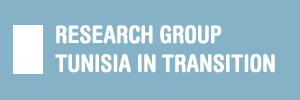Discussion in the Bavarian Parliament with MP Horst Arnold followed by a visit at the Bavarian State Chancellery
The Chair for International Politics at the University of Passau organised jointly with the Institute for Near and Middle Eastern Studies at the Ludwigs-Maximilians-University a workshop of the German-Arab Research Group “Tunisia in Transition”. The workshop, which gathered about 15 young researchers from Tunisia (Universities of Carthage, La Manouba and Tunis el-Manar) and ten from Germany (Universities of Munich and Passau), took place from October 9 to 13, 2013, in Munich. It had a fourfold objective: presenting and discussing individual and collective research, pursuing academic training, working on the professional perspectives of the young researchers and, finally, reaching out to public and politics.
Apart from joint research, a central aim of Tunisia in Transition is to build a bridge between academia and politics. By holding its biannual workshop in Munich, the capital of Bavaria, the project therefore took the opportunity to interact with members of the Bavarian Parliament and the Bavarian government. Thereby, the Tunisian participants gained a genuine insight into the German federal system.
But would federalism, which is very prominent in Bavaria, be a suitable concept for Tunisia as well? Or is the country, as one of the Tunisian participants remarked, too small for a federal state system? These and other questions were debated in a lively discussion with Member of Parliament Horst Arnold, who has been a deputy for the Social Democratic Party (SPD) since 2009 and is part of the committees for law, constitution and consumerism. Pointing to Switzerland, Mr. Arnold explained that a country’s size is not the most important characteristic for a federal system, the crucial question in his opinion is, whether different regions in Tunisia have distinct, historically rooted identities and interests. The Tunisian participants saw a risk of secession in the introduction of a federal system, acknowledging that Tunisia is not yet ripe for this kind of system. For Mr. Arnold, it is centralism rather than federalism that encourages secession, but he recognized that federalism can only flourish with the acceptance of the population and the solidarity of the regions. In Tunisia, the students agreed, the differences between the regions were still too great. Having visited Tunisia as part of a Parliament delegation in 2012, Mr. Arnold remarked that the biggest problem of the transition was that many structures, such as the distribution of wealth, still remained unchanged. The parties, he observed, were not very stable. He therefore encouraged the Tunisian fellows in particular to get involved with politics and society. Eager to do so, the Tunisians suggested that internships at the Landtag for Tunisian students and graduates would provide them with profound insight into the workings of a Parliament so that they could take these experiences to Tunisia.
The second part of the afternoon was devoted to the Bavarian government and administration. The research group was invited to a reception at the state chancellery, where a Tunisian state secretary and his delegation were present for an official visit. The participants took advantage of the opportunity to discuss with Bavarian and Tunisian government officials. Some of the communication science students even collected interviews. After this exciting meeting, not even the rain and snow or the icy temperatures could stop the participants from exploring the city of Munich.
In addition to discussing questions of federalism and decentralization with members of the ![]() Bavarian Parliament and officials of the Bavarian State Chancellery, the workshop reached out to a broader public with the roundtable “Have the revolutions gone wrong? Young perspectives from Tunisia, Egypt and Syria”. Anis Ben Amor from “Tunisia in Transition” was joined by Ebtisam Hussein (Egypt/University of Berlin) and Salim Salamah (Syria) in discussing achievements and failures of the transformation processes in their country.
Bavarian Parliament and officials of the Bavarian State Chancellery, the workshop reached out to a broader public with the roundtable “Have the revolutions gone wrong? Young perspectives from Tunisia, Egypt and Syria”. Anis Ben Amor from “Tunisia in Transition” was joined by Ebtisam Hussein (Egypt/University of Berlin) and Salim Salamah (Syria) in discussing achievements and failures of the transformation processes in their country.
In sum, the workshop constituted a central step in further developing the interdisciplinary German-Arab Research Group “Tunisia in Transition” and strengthening the capacities of its members. “Tunisia in Transition” is grateful for the support of the German Academic Exchange Service (DAAD) and for the commitment of all its partners. From Passau University, in addition to Edmund Ratka (project coordinator) and Johanna Speyer (assistant), the Professors Bernhard Stahl (International Politics) and Oliver Hahn (Journalism) as well Laura Jaspers and Katharina McLarren, PhD candidates at the Chair for International Politics, have participated in the event.
